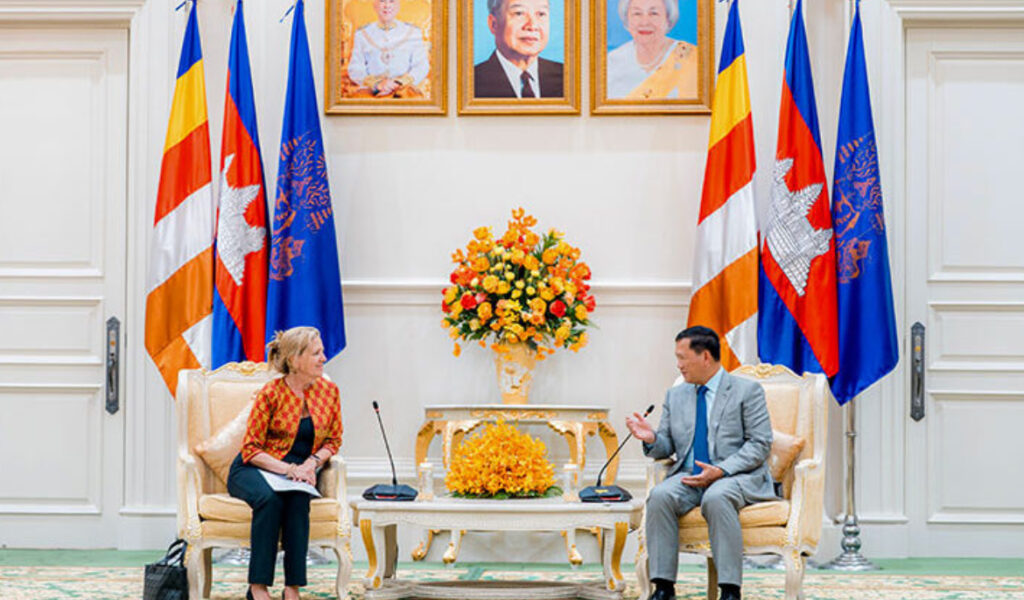Cambodia’s Vision 2050 received a boost as the World Bank Tuesday reaffirmed its commitment to supporting the country’s long-term development through a newly approved Partnership Framework (2025-2029).
The commitment was made during a high-level meeting between Prime Minister Hun Manet and Mariam J. Sherman, World Bank Country Director for Cambodia, Vietnam, and Laos at the Peace Palace in the capital.
Discussions centered on strengthening economic growth, infrastructure, and human capital, with a focus on fostering a resilient private sector and attracting investment to drive sustainable progress.
Sherman praised Cambodia’s rapid progress across various sectors and highlighted the strong partnership between the World Bank and the Royal Government of Cambodia in advancing the country’s socio-economic development.
She also informed Mr Hun Manet of the approval of the World Bank Partnership Framework for Cambodia (2025-2029), reaffirming the institution’s commitment to supporting Cambodia Vision 2050.
In response, the Prime Minister commended the World Bank for its continued support and contributions to Cambodia’s socio-economic growth.
The Premier apprised of the government policies aimed at diversifying and promoting growth and development, with a focus on key sectors such as the economy, agriculture, tourism, and infrastructure to enhance logistics. He also emphasized incentive policies to attract investment and key measures to foster a favorable business climate, particularly to strengthen private sector integration and resilience.
The discussion extended to human capital development, where the Prime Minister highlighted the government’s efforts to build human resources through basic education, vocational training, healthcare, and job creation for Cambodian citizens. Sherman voiced her support for these initiatives, noting the World Bank’s readiness to collaborate further on human capital development—a critical factor in achieving Cambodia Vision 2050.
Mr Hun Manet encouraged Sherman to work closely with relevant ministries and institutions to strengthen and expand the partnership between the Royal Government and the World Bank.
Speaking at the official inauguration of the school building, teacher’s dormitory, management building, and garment building at Hun Sen High School in Veal Renh, Preah Sihanouk province, on Wednesday, Mr Hun Manet said, “Yesterday, I met with the World Bank Managing Director for Cambodia, Vietnam, and Laos, and we discussed many key points.
The World Bank has been supporting us for more than 30 years, helping to build our country and continuing to plan further assistance.”
“In this regard, the World Bank, like the government, recognizes that our main strength is the human resources […] Therefore, education is crucial. Cooperation between Cambodia and the World Bank will focus on human resource development,” he said. This initiative is intended to support Cambodia in its journey toward achieving Vision 2050.
Speaking to Khmer Times, Lor Vichet, Vice President of the Cambodia Chinese Commerce Association (CCCA), emphasized the importance of developing human resources to adapt to the evolving global trade environment.
“Our priority is to strengthen human resources to respond to the changing international trade landscape and global situation. Strengthening human resources is also essential to meet the needs of the country as it transitions from an upper-middle-income country to a high-income country by 2050,” he said.
Vichet noted that this transition represents a critical phase for Cambodia’s economy. “This transition to a high-income country is a crucial stage. We are evolving from an economy heavily dependent on the Garment, Footwear, and Travel Goods (GFT) industry to a more diversified economy,” he added.
To support this shift, the country plans to revamp traditional sectors and develop high-value industries. “Additionally, we will transform traditional industries into value-added sectors through the modernization of manufacturing, while also reducing the time required for global supply chains and developing physical infrastructure, as well as fostering regional and global economic integration,” Vichet said.
This broad economic shift necessitates a strategic investment in human resources. “Therefore, human resource development must shift from being labor-intensive to skilled-intensive. To achieve Vision 2050, we must strengthen human resources in the industrial sector,” he added, highlighting the critical role that workforce development plays in the nation’s future prosperity.
According to the report Pentagonal Strategy – Phase I for Growth, Employment, Equity, Efficiency, and Sustainability: Building the Foundation Toward Realizing Cambodia Vision 2050, now, Cambodia is entering a new phase of development with the ambition to achieve Cambodia Vision 2050—becoming a high-income nation with a resilient economy, advanced digital infrastructure, and sustainable growth.
To realize this vision, the government has introduced the Pentagonal Strategy – Phase I, which focuses on five key priorities: People, Roads, Water, Electricity, and Technology. These priorities are designed to drive economic modernization, enhance human capital, and strengthen governance, ensuring Cambodia’s global competitiveness.
The Pentagonal Strategy will serve as a guiding framework for policies such as the National Strategic Development Plan (NSDP) 2024-2028, ensuring measurable progress in governance, economic growth, financial stability, human capital development, and environmental sustainability. A strong emphasis is placed on digital transformation to meet the demands of the Fourth Industrial Revolution and enhance productivity.
Building on past achievements, Cambodia aims to accelerate its transformation by fostering innovation, entrepreneurship, and inclusive development. With a solid foundation of peace, stability, and forward-looking policies, the country is on track to become a prosperous, high-income nation by 2050, securing a better future for all its people.



